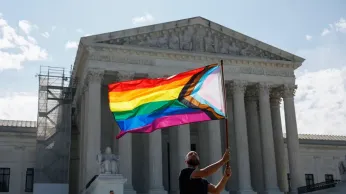
3 hours ago
31 States Could Ban Marriage Equality if Obergefell Is Overturned
READ TIME: 3 MIN.
As the U.S. Supreme Court faces mounting pressure to reconsider its 2015 landmark decision in Obergefell v. Hodges, the future of marriage equality in America hangs in the balance. Advocates warn that if Obergefell is overturned, at least 31 states could immediately reinstate bans on same-sex marriage, threatening hard-won rights for hundreds of thousands of LGBTQ+ couples and their families .
Before 2015, marriage laws in the United States varied widely by state. At the time Obergefell was decided, 35 states had constitutional or statutory bans on same-sex marriage, while only eight states had legalized such unions . Obergefell v. Hodges established that the right to marry is a fundamental liberty protected by the Fourteenth Amendment, requiring all states to license and recognize marriages between same-sex couples.
This decision followed earlier progress, including United States v. Windsor (2013), which struck down the Defense of Marriage Act’s definition of marriage as exclusively between a man and a woman, and the Respect for Marriage Act (2022), which requires federal and state recognition of legal same-sex and interracial marriages performed in any state .
The renewed threat to marriage equality is being driven by a coalition of conservative activists and religious groups. In 2025, at least nine states have introduced legislation to block new marriage licenses for LGBTQ+ people or passed resolutions urging the Supreme Court to reverse Obergefell . The Southern Baptist Convention, the largest Protestant Christian denomination in the country, recently voted to make overturning Obergefell a top legislative priority.
Meanwhile, Kim Davis, the Kentucky county clerk who refused to issue marriage licenses to same-sex couples after Obergefell, has petitioned the Supreme Court to revisit the decision, arguing that it infringes on her religious freedom . Legal experts caution that the current conservative supermajority on the Court increases the risk that such petitions could gain traction .
If Obergefell is overturned, marriage equality would not automatically become illegal nationwide. Instead, the legal landscape would revert to a pre-2015 patchwork, where each state determines its own marriage laws . Thirty-one states have existing constitutional amendments or statutes banning same-sex marriage, which would likely become enforceable again .
Legal experts note that the Respect for Marriage Act would still require states and the federal government to recognize existing marriages performed in any state, even if new marriages are banned locally . However, couples residing in states with bans could face significant barriers to marriage, parental rights, healthcare access, and spousal benefits .
The potential rollback of marriage equality would have immediate and profound effects on LGBTQ+ families across the country. There are an estimated 823,000 married same-sex couples in the U.S., including 591,000 who wed after Obergefell. Nearly 20% of these couples are raising children under the age of 18, according to the Williams Institute at UCLA Law .
If marriage licenses are no longer available to same-sex couples in many states, these families could lose access to key legal protections, such as spousal health insurance, hospital visitation rights, parental recognition, inheritance, and medical decision-making . Experts warn that such legal instability is likely to increase exposure to discrimination, worsen mental and physical health outcomes, and threaten the well-being of LGBTQ+ children .
The debate over marriage equality is unfolding against a backdrop of increasing legislative and judicial attacks on LGBTQ+ rights nationwide. Advocates fear that overturning Obergefell could set a precedent for rolling back other civil rights advances, including protections for transgender people, workplace non-discrimination, and reproductive freedom . The Supreme Court’s recent willingness to revisit settled precedents, as seen in the Dobbs v. Jackson ruling that overturned Roe v. Wade, has heightened concerns among civil rights organizations .
While legal experts are divided on the likelihood that the Supreme Court will actually overturn Obergefell, the risk is no longer hypothetical . Many LGBTQ+ advocates are urging Congress to strengthen federal protections and are mobilizing grassroots campaigns to safeguard marriage equality at the state level.
In the meantime, LGBTQ+ individuals, couples, and families are left facing deep uncertainty about their future rights and protections. For now, marriage equality remains the law of the land, but the possibility of a seismic legal shift looms — one that could reshape the lives of millions of Americans for years to come .






